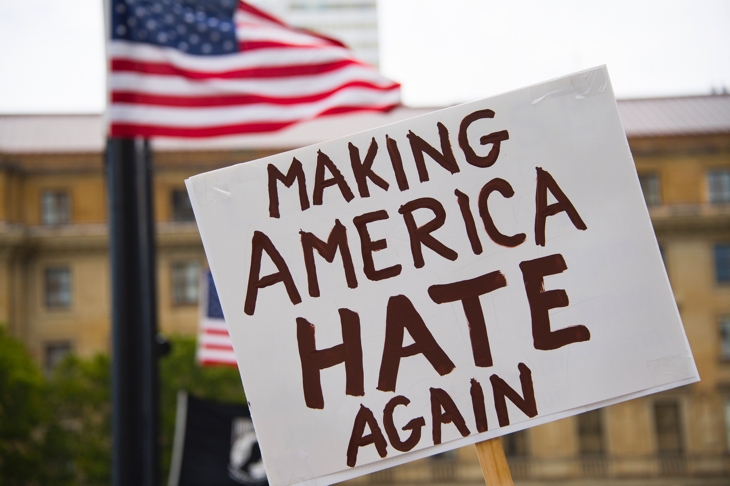Identity politics is turning violent. It’s been brewing for a while. Anyone who’s witnessed mobs of students threatening to silence white men or Islamists gruffly invading the space of secular women who diss their dogmas will know that, as with all forms of communalism, identity politics has a menacing streak. And at the weekend, in Charlottesville, Virginia, it blew up. That ugly clash between blood-and-soil white nationalists and people crying ‘black lives matter’ is the logical outcome of the identitarian scourge, of the relentless racialisation of public life.
Charlottesville was both shocking and unsurprising. It was shocking because here we had actual Nazis, waving swastika flags, in 21st-century America, the land of the free. That is deeply disturbing. But it was also unsurprising because in recent years, across the West, people have been invited, implored in fact, to think racially. To be ‘racially aware’. To think of themselves as belonging to a particular race, and to believe their racial make-up confers certain privileges or penalties on them — it shapes them. The young men hollering about ‘white pride’ at Charlottesville are surely responding to this racial invitation. They’re being ‘racially aware’.
To those of us who believe in racial equality, who admire Martin Luther King’s vision of a society in which character counts for more than colour, the rise of this PC and profoundly divisive racial consciousness has felt alarming. The pressure to view every aspect of life and culture through a racial lens has become intense. The academy wrings its hands over all the Dead White European Males in the canon. Student radicals claim white philosophy isn’t suited to black students. The idea of ‘racial microaggressions’ invites us to view even everyday conversation as loaded with racial tension. Leftists regularly claim that Brexit and Trump and other things they hate are the fault of ‘old white men’. ‘Dear White People’, say PC people, before launching into a diatribe against ‘white’ behaviour. Race has become the explanation for everything, the obsession of the age.
Things have got so bad that anyone who seeks to resist racial thinking, on the humanist basis that people are individuals rather than bundles of DNA or the unwitting products of history, can expect to be rounded on. To say ‘I don’t see race’ is ‘actually quite racist’, says a writer for the Guardian. The University of California’s guide to acceptable speech — many campuses have one these days — describes statements like ‘I don’t believe in race’ and ‘There is only one race: the human race’ as ‘microaggressions’, because they fail to acknowledge the individual as a ‘racial/cultural being’. In the past, refusing to treat individuals as racial/cultural beings was a good thing. Now it’s bad. You must treat people as expressions of race. And if you don’t, you’re racist. Talk about doublespeak.
This is the foul nature of identity politics. It defines people, not by their achievements or beliefs, not by their character or work, but by their skin colour, their genitals, their sexuality. By their inherited traits rather than things they’ve done through the exercise of their own autonomy. ‘As a black woman’, ‘As a white man’, ‘As a mixed-race genderqueer’… these are the baleful prefaces to speech and debate in the 21st century, because what matters most is not what a person believes but what shade their skin is or what chromosomes they possess. Biology trumps belief: a full and foul reversal of the modern, enlightened idea that the individual can escape the circumstances of his birth and determine his destiny for himself.
And as part of this truly nasty business, we have witnessed the rise of white identity. Some people have an apparently ‘correct’ white identity: they check their white privilege, they go on demos with placards saying ‘I was going to write my opinion, but it’s probably about time white men just shut up and listened’. White shame. And others, like those gurning torch-carriers at Charlottesville, have a bad white identity: they love being white, they think it’s better than being black, they flirt with Nazi ideology. White pride. But these seemingly opposed whites share something very important in common: they’ve embraced racial identity. They define themselves as white. They have responded to the cry of the identitarian and made themselves into racial creatures. And both sides bristle with menace, as can be seen in the contorted faces of the ‘bad whites’ in the alt-right and in those ‘good whites’ who yesterday pulled down the Confederate Soldiers statue in North Carolina and then kicked and spat on it.
Those whites at Charlottesville look to me like ugly products of identity politics, of the elevation of trait over conviction, nature over character. Popular culture and the mainstream media say over and over again, ‘You are white, you are a white man, that is your identity, that is your privilege, admit it and own it’, and those men have simply turned around and said: ‘Okay.’ A serious problem in this young millennium, perhaps the biggest problem, is the retreat from universalism, the surrender to the racial imagination. It has green-lighted a neo-racialism without realising how lethal this is. Anyone who thinks they can racialise public life without creating tension and storing up violence is clearly unfamiliar with history.







Comments